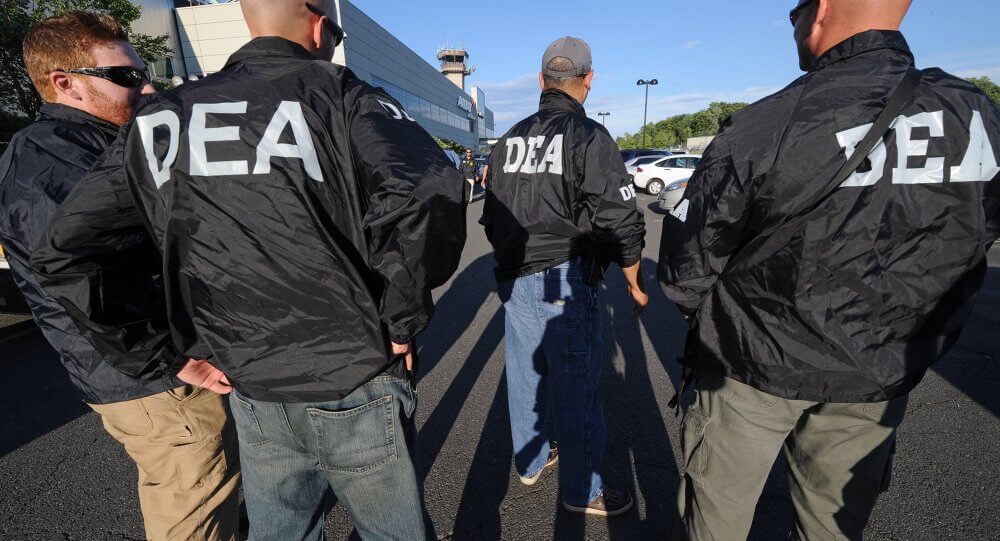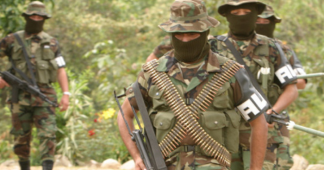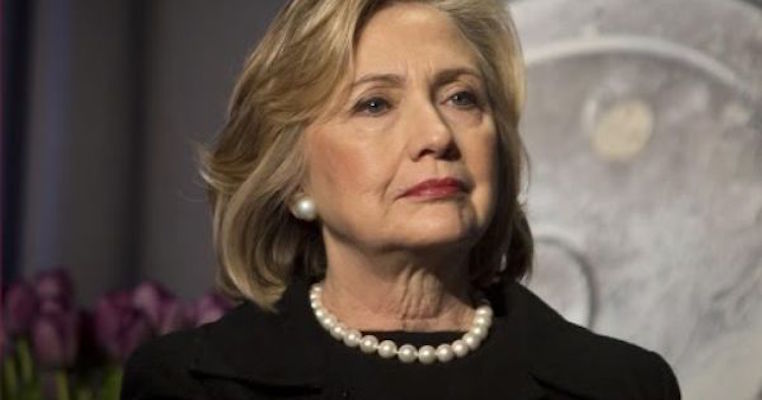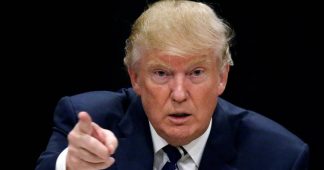Over the past several months, drug-related violence in Mexico has been soaring, accelerating an already alarming trend of rising drug-related deaths and contributing to what one former U.S. official has called “a decade-long bloodbath.”
To some extent, the latest spike in violence is nothing new for Mexico. For more than a decade, Mexico has experienced waves of drug-related violence as the Mexican government has waged an internal drug war against the country’s drug cartels. “Successive Mexican presidents have implemented policies aimed at disrupting these drug-trafficking organizations, but the result has been a decade-long bloodbath that has cost more than 100,000 deaths to the ensuing violence,” former State Department official Roger Noriega said earlier this year.
At the same time, the spike in violence shows that Mexico’s struggles are far from over. Although a steady decline in violence from 2012 to 2014 raised hopes that the situation was improving, the trend reversed in 2014 and has only worsened since then. “Mexico’s bloody drug war is killing more people than ever,” the Los Angeles Times reported in July.
Observers cite numerous reasons for the increase in violence. They blame everything from the fracturing of drug cartels to the inability of local police forces to deal with the situation.
Officials in the Trump administration, who entered office at a time of increasing violence, have provided their own novel interpretation. Citing the national opioid epidemic in the United States, administration officials have blamed U.S. drug users for breathing new life into the Mexico’s illicit drug business. “But for us, Mexico wouldn’t have the trans-criminal organized crime problem and the violence that they’re suffering,” Secretary of State Rex Tillerson recently argued. So “we really have to own up to that.”
At the Aspen Security Forum in July, Secretary of Homeland Security John Kelly, who is now Trump’s Chief of Staff, also blamed U.S. drug users for the spike in violence. Countries such as Mexico “suffer terribly because of the violence of the trafficking and the production,” Kelly said. “So as Americans we should be ashamed of ourselves that we have done almost nothing to get our arms around drug demand.”
Despite these arguments, the leaders of the United States know that they bear significant responsibility for the violence in Mexico. While it is true that an opioid epidemic is sweeping across the United States, claiming more than 100,000 lives over the past few years, U.S. officials are the ones who have played a far more direct role in fanning the flames of violence in Mexico. For starters, they are the ones who devised and implemented the Mérida Initiative, a multi-billion dollar assistance package that has been a primary cause of the drug-related violence. In addition, they are the ones who have spent more than a decade urging the Mexican government to confront the country’s drug cartels, even though various escalations have made the violence worse. Rather than blaming the growing violence on U.S. drug users, officials in Washington should be paying closer attention to the their own actions, which have been fueling Mexico’s decade of violence.
The War Begins
The ongoing crisis in Mexico dates back to December 2006, when Mexican President Felipe Calderón went to war against the country’s drug cartels. Although it was unclear whether Calderón was legally justified in launching the internal military campaign, he set aside such concerns and began deploying tens of thousands of military forces across the country, setting off a major drug war.
“Calderon has launched major military-backed surge operations against drug traffickers in nine of the most conflictive states,” U.S. diplomats in Mexico explained in an internal report in April 2007.
Right away, the military-backed surge operations had devastating consequences for Mexico. Not only did they prompt a vicious backlash from the country’s drug cartels, but they sparked an increase in drug-related violence, or “soaring Cartel-related bloodshed,” as U.S. diplomats described it.
Nevertheless, U.S. officials remained optimistic about the operations. Instead of questioning the logic of legally dubious military operations that were increasing violence in the country, they began thinking that they should help the Mexican government escalate the operations.
“Now is the time for us to show our appreciation and respect for our neighbor’s commitment to the rule of law by significantly increasing our material support to the GOM’s law enforcement efforts,” U.S. diplomats in Mexico insisted.
The Mérida Initiative
Taking the advice of its diplomats, the Bush administration began devising a new military assistance program for the Mexican government called the Mérida Initiative.
According to U.S. Senator Harry Reid, the Mérida Initiative was made possible by the resolve that Calderón had shown in going after the country’s drug cartels. “That resolve paved the way for USG action on the Mérida Initiative,” Reid told Calderón in November 2007.
The terms of the deal, which were finalized the following year, brought a whole new phase to the drug war. Not only did the Mérida Initiative provide the Mexican government with a massive infusion of U.S. military support, but it also opened the door to a more direct U.S. role.
“The U.S. is about to insert itself in a major way into this challenging environment with the impending rollout of the Mérida Initiative,” U.S. diplomats in Mexico reported in December 2008.
As U.S. officials began implementing the Mérida Initiative, drug-related violence in the country increased rapidly. It quickly surpassed the previous rise in violence that began with Calderón’s surge operations, claiming more lives in some of the most horrific ways possible. Beheaded and dismembered bodies, which had already become common sights throughout the country, kept appearing more frequently.
“Levels of violence show no signs of decreasing, with organized crime-related homicides and casualties suffered by security forces in the counterdrug fight likely to surpass 2008’s record figures,” U.S. diplomats in Mexico informed President Obama in July 2009.
The violence peaked in 2011 with more than ten thousand people killed. A few years into the Mérida Initiative, Mexico had become one of the deadliest countries in the world.
“Violence is unprecedented, people are afraid, mayors are being killed,” U.S. Ambassador to Mexico Carlos Pascual observed.
The Pause to Mérida
The rising drug-related violence did not continue indefinitely. Starting in 2012 and continuing into the following years, Mexico experienced a slow and steady decline in drug-related violence, which for a time approached pre-Mérida levels.
The reversal was largely due to changes in Mexican politics. Not only were the Mexican people beginning to protest the drug war, but Mexican politicians began calling for major changes in the war.
During Mexico’s 2012 presidential campaign, all three leading presidential candidates pledged to shift tactics and reduce drug-related violence in the country.
The winner of the election, Enrique Peña Nieto, promised major changes. During his inauguration in December 2012, Peña Nieto announced that his primary goal was to reduce drug-related violence. “My government’s first aim will be to bring peace to Mexico,” Peña Nieto said.
Peña Nieto acted on his pledge. As U.S. officials later confirmed, Peña Nieto halted the implementation of any new programs under the Mérida Initiative. “There was a huge pause,” one U.S. official later said. The program came to a “screeching halt,” another U.S. official agreed.
Most important, the pause to Mérida programs addressed the concerns of the Mexican people by reducing drug-related violence. While U.S. officials kept trying to stop the pause and get the Mérida Initiative back on track, drug-related violence steadily declined in the following years. Indeed, Peña Nieto helped to reverse the alarming trends in drug-related violence by impeding one of its main causes, the Mérida Initiative.
The Revival of Mérida
In spite of these hopeful signs, the pause did not last long. Instead of making the pause permanent and extending it to the remaining Mérida programs, Peña Nieto eventually reversed course. Working closely with U.S. officials, he agreed to approve a series of new programs that revived the Mérida Initiative, thereby reigniting the drug war.
In May 2014, State Department official William Brownfield provided a basic explanation of what happened for the House Committee on Foreign Affairs. Essentially, “there was a period where both governments, logically and understandably, said let us review what is the nature of the cooperation that we have today,” Brownfield explained. “This process took some time. Much of the year 2013 was dedicated to it.”
In other words, the new Mexican government kept reviewing various Mérida programs before deciding to move forward with new operations.
After spending a year to review the programs, both the U.S. and Mexican governments then agreed to move forward with new operations. “We have reached an agreement on $438 million worth of 78 new programs,” Brownfield said.
A senior State Department official provided additional confirmation of the change. There has been some concern about “a slowdown in the Mérida Initiative and the funding that we were doing for some of the security projects,” the official said. “But you’ve now seen over $430 million of funds approved for projects, 78 projects approved. Those will now be pushed forward.”
The decision to push forward new Mérida programs had a familiar effect. Just as previous intensifications of military operations increased violence in the country, the revival of the Mérida Initiative sparked a new phase in drug-related violence.
In fact, drug-related violence quickly returned to its previous highs. Nearly 10,000 people died in 2015, more than 10,000 people died in 2016, and the total death toll is expected to be even higher for 2017.
“Mexico is reaching its deadliest point in decades,” the New York Times reported earlier this month.
Trump’s Plans
Making matters worse, the Trump administration has been eager to expand the programs. So far, the Trump administration has publicly supported the Mérida Initiative and indicated that it intends to intensify the drug war.
President Trump clearly articulated his intentions when he first entered office. Speaking with Peña Nieto in January, Trump said that he wanted to work more closely with the Mexican government to deliver a final blow against the country’s drug cartels. “Enrique, you and I have to knock it out – you and I have to knock the hell out of them,” Trump said. “Listen,” he added. “I know how tough these guys are – our military will knock them out like you never thought of.”
While it remains unclear whether the Trump administration will send U.S. forces to Mexico, additional officials have similarly called on Mexican officials to intensify the war. A few months after Trump made his proposal, Secretary of State Rex Tillerson advised Mexican officials to do more to confront the country’s drug cartels. “I told my Mexican counterparts it’s time to stop playing small ball, we’ve got to start playing large ball,” Tillerson told the Senate Committee on Foreign Relations in June.
In these ways, the Trump administration has urged the Mexican government to work more closely with the United States to escalate the drug war. Despite the fact that heavy U.S. involvement through the multi-billion dollar Mérida Initiative has only succeeded in bringing more violence to the country while fueling its decade-long bloodbath, the Trump administration has been moving to intensify the ongoing military efforts, placing even more lives at risk.
“Your citizens are being killed all over the place, your police officers are being shot in the head, and your children are being killed,” Trump said during his conversation with Peña Nieto. But for Trump, those were not reasons to reconsider U.S. policy. Instead, those were reasons to increase U.S. involvement in the ongoing fight against Mexico’s drug cartels.
“And we will knock them out,” he promised.











